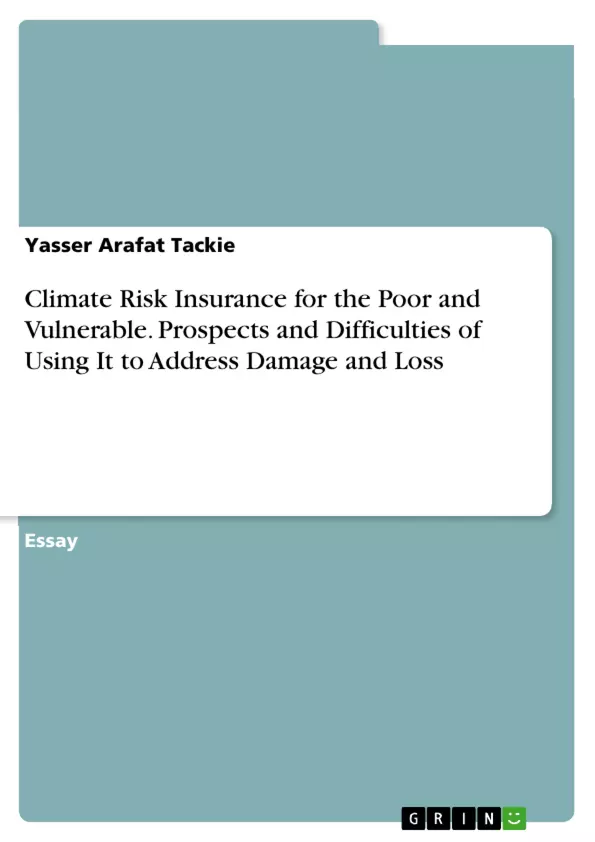This paper examines the role of Climate Risk Insurance (CRI) as a strategy to mitigate the financial impacts of extreme weather events on the world's most vulnerable regions, particularly low-income countries. While CRI offers potential benefits by providing timely financial resources and promoting resilience, it also faces challenges such as affordability, accessibility, and moral hazard. The study explores different insurance models, including micro and macro-level approaches, and evaluates their effectiveness in addressing climate-related losses. It also discusses the necessity of international cooperation, such as solidarity funds and climate damage tax systems, to support the implementation of CRI. Ultimately, the paper argues for a comprehensive, justice-oriented approach to CRI, emphasizing the need for accessible insurance solutions and direct aid mechanisms to protect the most vulnerable populations from the escalating impacts of climate change.
Inhaltsverzeichnis (Table of Contents)
- Introduction
- The concept of Climate Risk Insurance
- Challenges and Opportunities
- Discussion
Zielsetzung und Themenschwerpunkte (Objectives and Key Themes)
This work explores the prospects and challenges of using Climate Risk Insurance (CRI) to address climate change-related damage and loss, particularly for vulnerable populations. It examines the effectiveness of CRI as a tool for climate risk management, considering various approaches and their applicability at different scales.
- The role of CRI in addressing climate change impacts on vulnerable communities.
- Different approaches to CRI, including microinsurance, derivatives, and index-based insurance.
- Challenges related to affordability, accessibility, and the design of effective CRI products.
- The importance of climate justice and the polluter-pays principle in financing CRI.
- The potential of community-based insurance schemes to reach vulnerable populations.
Zusammenfassung der Kapitel (Chapter Summaries)
Introduction: This chapter introduces the increasing frequency and severity of extreme weather events due to climate change, focusing on the disproportionate impact on vulnerable and poor regions. It highlights the limitations of existing post-disaster aid and introduces Climate Risk Insurance (CRI) as a proposed solution, tracing its role in international climate negotiations and initiatives like InsuResilience.
The concept of Climate Risk Insurance: This section details the fundamental concept of CRI as a risk transfer mechanism, comparing indemnity-based and index-based insurance approaches. It discusses the advantages of CRI, such as the early availability of funds and potential incentives for risk reduction.
Challenges and Opportunities: This chapter discusses the challenges of CRI, including moral hazard and adverse selection, and questions its applicability to slow-onset events. The key problem of ensuring access for the most vulnerable populations is introduced, highlighting issues of affordability and the need for subsidies.
Schlüsselwörter (Keywords)
Loss and Damage, Climate Change, Climate Risk Insurance, Vulnerable, Poverty, Injustice, Climate Justice, Polluter-Pays Principle, Microinsurance, Index-based Insurance, Community-based Insurance, Affordability, Accessibility.
- Quote paper
- Yasser Arafat Tackie (Author), Climate Risk Insurance for the Poor and Vulnerable. Prospects and Difficulties of Using It to Address Damage and Loss, Munich, GRIN Verlag, https://www.grin.com/document/1504952



